Related Research Articles
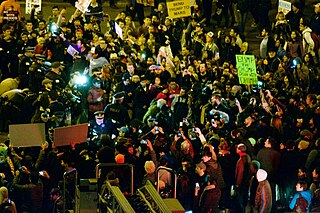
On March 11, 2016, the Donald Trump presidential campaign canceled a planned rally at the University of Illinois Chicago (UIC), in Chicago, Illinois, citing "growing safety concerns" due to the presence of thousands of protesters inside and outside his rally.

Protests against Donald Trump have occurred in the United States, Europe and elsewhere from his entry into the 2016 presidential campaign to his loss to Joe Biden in the 2020 presidential election. Protests have expressed opposition to Trump's campaign rhetoric, his electoral win, his inauguration, his alleged history of sexual misconduct and various presidential actions, most notably his travel ban in 2017 and his aggressive family separation policy in 2018. Some protests have taken the form of walk-outs, business closures, and petitions as well as rallies, demonstrations, and marches. While most protests have been peaceful, actionable conduct such as vandalism and assaults on Trump supporters has occurred. Some protesters have been criminally charged with rioting. The largest organized protest against Trump was the day after his inauguration; millions protested on January 21, 2017, during the Women's March, with each individual city's protest taken into consideration, makes it the largest single-day protest in the history of the United States.

On November 10, 2016, three days of protests in Portland, Oregon, turned into a riot, when a group of anarchists broke off from a larger group of peaceful protesters who were opposed to the election of Donald Trump as president of the United States.
From November 9–12, 2016, protests occurred in Oakland, California, against the election of Donald Trump. While originally peaceful, these protests became violent, with protesters lighting trash cans and cars and a building on fire and smashing store windows and throwing bottles at police. Thirty protesters were arrested, and three officers were injured.

The following is a timeline of the protests against Donald Trump, the former president of the United States of America, businessman, and television personality.
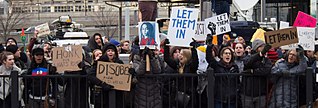
In late January and early February 2017, during protests against Executive Order 13769, commonly referred to as the “Muslim ban,” thousands of people gathered at various airports in the United States and around the world to protest the attempt by the Trump administration to prevent the prohibition refugees and visitors from seven countries considered by the administration to be unsafe. According to various sources, more than two thousand people were at the protest at John F. Kennedy International Airport in Queens, New York City with other protests appearing at significant international airports and other important sites around the United States. Protests continued daily and internationally through February 6. Protests also continued after a federal judge issued a temporary restraining order against parts of the travel ban.

The 2017 Berkeley protests were a series of protests and clashes between organized groups that occurred in the city of Berkeley, California, in the vicinity of the University of California campus. Violence occurred predominantly between protesters opposed to then-President Donald Trump, including activists such as antifa groups and socialists; and pro-Trump groups such as Republicans, members of the alt-lite and alt-right, neo-Nazis, and white nationalists. The majority of the participants were peaceful.

"Not My Presidents Day" was a series of rallies against the president of the United States, Donald Trump, held on Washington's Birthday, February 20, 2017. Protests were held in dozens of cities throughout the United States. Demonstrations were also held outside London's Houses of Parliament.
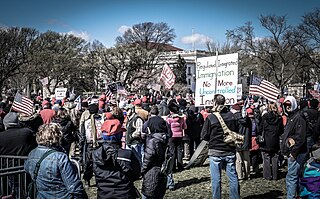
March 4 Trump was a series of more than two dozen demonstrations organized throughout the United States on March 4, 2017, in support of President Donald Trump. The official message of the demonstration was "Stop the fight. Let's all unite." The founder of the March 4 Trump movement is Vincent Haney, who says he was inspired to create a peaceful pro-Trump movement after listening to commentary by famous individuals speaking out against Trump and watching the anti-Trump marches. Some of the March organizers were part of the Tea Party movement.
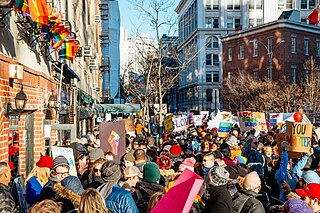
There were several protests organized by the LGBT community against the policies of United States President Donald Trump and his administration.
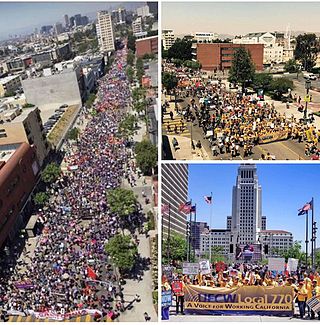
The 2017 May Day protests were a series of protests that took place on May Day over worker and immigrant rights, throughout the United States and around the world. Protests became violent in Olympia, Washington, and Portland, Oregon. Many demonstrators were protesting against the policies of President Donald Trump, specifically those related to immigration.
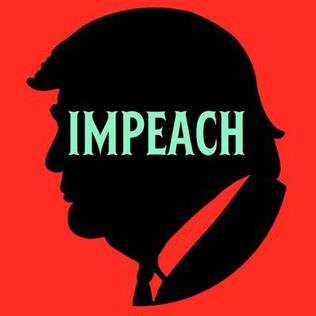
The Impeachment March, sometimes referred to as the "Impeach Trump" protest, was a series of rallies against the president of the United States, Donald Trump, held nationwide on July 2–4, 2017, advocating that Congress begin the impeachment process against him.

The Unite the Right rally was a white supremacist rally that took place in Charlottesville, Virginia, from August 11 to 12, 2017. Marchers included members of the alt-right, neo-Confederates, neo-fascists, white nationalists, neo-Nazis, Klansmen, and far-right militias. Some groups chanted racist and antisemitic slogans and carried weapons, Nazi and neo-Nazi symbols, the Valknut, Confederate battle flags, Deus vult crosses, flags, and other symbols of various past and present antisemitic and anti-Islamic groups. The organizers' stated goals included the unification of the American white nationalist movement and opposing the proposed removal of the statue of General Robert E. Lee from Charlottesville's former Lee Park. The rally sparked a national debate over Confederate iconography, racial violence, and white supremacy. The event had hundreds of participants.

Patriot Prayer is a US far-right group founded by Joey Gibson in 2016 and based in Vancouver, Washington, a suburban city in the Portland metropolitan area. Since 2016, the group has organized several dozen pro-gun, pro-Trump rallies held in cities in the Pacific Northwest and Northern California. Often met with large numbers of counter-protesters, attendees have repeatedly clashed with left-wing groups in the Portland area. Far-right groups, such as the Proud Boys, have attended the rallies organized by Patriot Prayer, as well as white nationalists, sparking controversy and violence.

The Trump Unity Bridge, also known as the Presidential Trump Unity Bridge and Trump Mobile, is a decorated float being driven by a Michigan resident throughout the United States, supporting the 45th President, Donald Trump. The float appeared at Trump's inauguration, the 2017 Women's March, and the Mother of All Rallies.

Beginning in early April 2020, there were protests in several U.S. states against government-imposed lockdowns in response to the COVID-19 pandemic in the United States. The protests, mostly organized by conservative groups and individuals, decried the economic and social impact of stay-at-home orders, business closures, and restricted personal movement and association, and demanded that their respective states be "re-opened" for normal business and personal activity.

In 2020, a series of protests took place in California related to the murder of George Floyd on May 25, 2020, in Minneapolis, Minnesota, while in police custody. On May 31, 2020, the California Department of Human Resources advised "all state departments with offices in downtown city areas" to close on June 1.

This is a list of protests that took place in San Diego County, California, following the murder of George Floyd that took place on May 25, 2020 in Minneapolis, Minnesota, after police officer Derek Chauvin knelt on his neck for 9 minutes and 29 seconds. These events were created to fight for justice for George Floyd and other Black community members who suffer from police brutality. These demonstrations resulted in a number of policy changes, namely the ban of the cartoid neck restraints use in San Diego County and a city-wide independent review board that would review police practices.

Protests began in multiple cities in the United States following the 2020 United States presidential election between then-President Donald Trump and Democratic Party challenger Vice President Joe Biden, held on November 3, 2020. Biden won the election, receiving 81.3 million votes (51.3%) to Trump's 74.2 million (46.9%) and winning the Electoral College by 306 to 232. Biden's victory became clear on November 7, after the ballots had been tabulated. The Electoral College voted on December 14, in accordance with law, formalizing Biden's victory.
References
- 1 2 Kenny, Steve (29 April 2016). "Protest Turns Violent at Donald Trump Rally". The New York Times . Retrieved 2017-03-31.
- ↑ Edwards, Chelsea (2016-04-29). "Chaos erupts outside Donald Trump rally in Costa Mesa; 20 arrested". Abc7.com. Retrieved 2017-03-31.
- ↑ "2 teens arrested in vandalism of Costa Mesa police cars after Trump rally". Los Angeles Times . 2016-06-07. Retrieved 2017-03-31.
- ↑ "Slideshow: Protests get violent in Costa Mesa as Trump rally draws to a close | 89.3 KPCC". Scpr.org. 2016-04-28. Retrieved 2017-03-31.
- ↑ "Outside Trump rally, protesters grow violent". Los Angeles Times . 2016-04-29. Retrieved 2017-03-31.
- ↑ "Protests rage outside Trump rally in Orange County; 17 arrested, police car smashed". Los Angeles Times . 2016-04-29. Retrieved 2017-03-31.
- ↑ Tuzee, Michelle (2016-04-29). "VIDEO: Car spins donuts around Donald Trump protesters". Abc7.com. Retrieved 2017-03-31.
- ↑ "17 Arrested After Demonstrations at Donald Trump Rally Turn Violent | NBC Southern California". Nbclosangeles.com. 28 April 2016. Retrieved 2017-03-31.
- ↑ "Video: Police cruiser smashed in post-Donald Trump rally protest in Costa Mesa, 18 arrested". Ocregister.com. 2016-04-29. Retrieved 2017-03-31.
- ↑ Vitali, Ali (29 April 2016). "20 Arrested as Crowd Turns Violent Outside Trump Rally in California". NBC News . Retrieved 2017-03-31.
- ↑ "Trouble at Trump rally prompts apology, criticism from Fair Board - Daily Pilot". Los Angeles Times . 2016-05-26. Retrieved 2017-03-31.